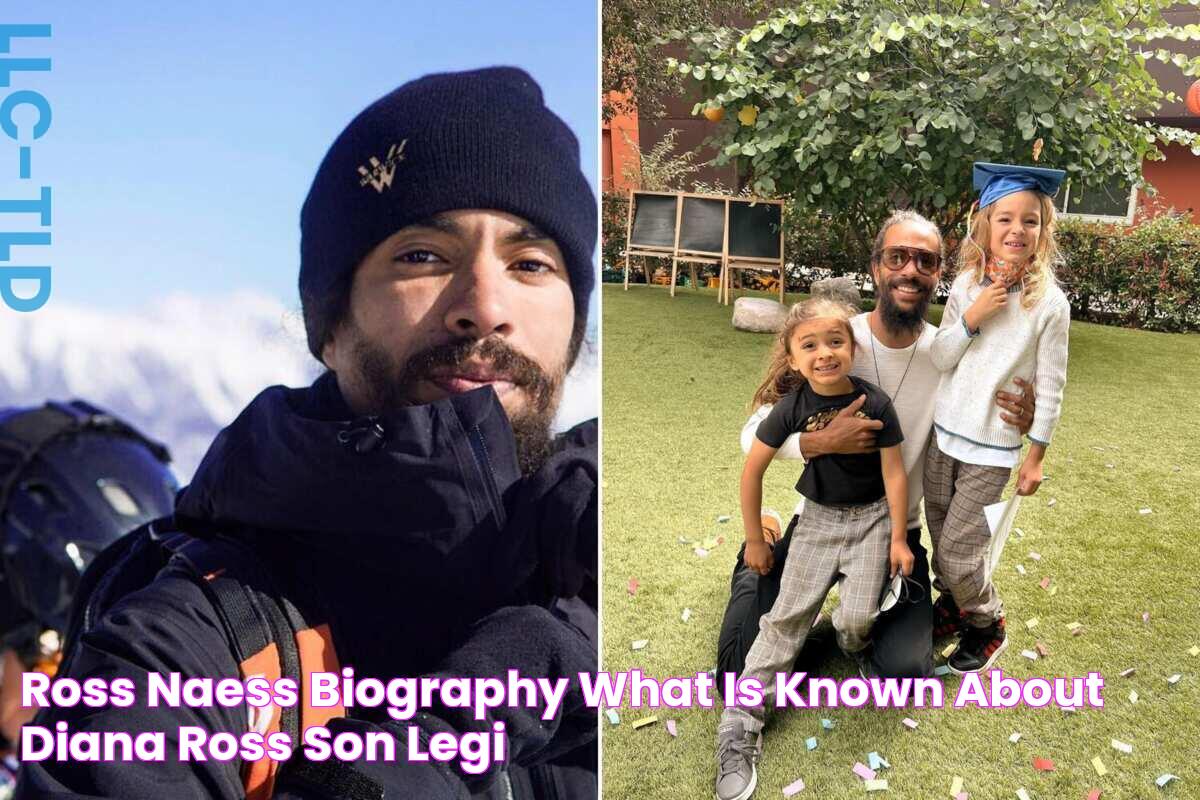The Ultimate Guide To Ross Naess: Exploring His Life, Career, And Legacy
Ross Naess is a Norwegian-born climate activist and environmentalist. He is the founder of the Rainforest Foundation Norway, which works to protect the rainforests of the world.
Naess was born in Oslo, Norway, in 1953. He became interested in environmentalism at a young age, and he began working to protect the rainforests in the early 1980s. In 1989, he founded the Rainforest Foundation Norway, which has since become one of the world's leading rainforest protection organizations.
Naess is a strong advocate for the rights of indigenous peoples, and he believes that they are the best stewards of the rainforests. He has worked closely with indigenous communities in the Amazon rainforest, the Congo Basin, and Southeast Asia.
Read also:The Ultimate Guide To Apponfly A Powerful App Testing Tool
Naess has received numerous awards for his work, including the Sophie Prize in 2008 and the Right Livelihood Award in 2014. He is a member of the Club of Rome, and he is a UN Goodwill Ambassador for Indigenous Peoples.
Naess is a passionate and dedicated environmentalist, and he has made a significant contribution to the protection of the rainforests. He is an inspiration to all who are working to create a more sustainable world.
Ross Naess
Ross Naess, a renowned environmentalist and climate activist, has dedicated his life to safeguarding the world's rainforests. His work encompasses a range of key aspects, including:
- Rainforest Protection: Naess is the founder of the Rainforest Foundation Norway, a leading organization dedicated to protecting rainforests.
- Indigenous Rights: He advocates for the rights of indigenous peoples, recognizing their role as stewards of the rainforests.
- Climate Activism: Naess actively campaigns to address climate change's impact on rainforests and indigenous communities.
- Environmental Advocacy: He uses his platform to raise awareness about environmental issues and promote sustainable practices.
- Awards and Recognition: Naess has received prestigious awards, including the Sophie Prize and Right Livelihood Award, for his environmental contributions.
- Collaboration: He collaborates with indigenous communities, scientists, and policymakers to find solutions for rainforest conservation.
- Inspiration: Naess serves as an inspiration to environmentalists worldwide, demonstrating the power of individual action.
- Legacy: His unwavering commitment to rainforest protection will have a lasting impact on the planet's ecosystems and indigenous communities.
These key aspects highlight the multifaceted nature of Ross Naess's work. His dedication to rainforest protection, advocacy for indigenous rights, and climate activism make him a respected figure in the environmental movement. Through his tireless efforts, Naess continues to inspire and motivate others to join the fight for a sustainable future.
1. Rainforest Protection
Ross Naess's dedication to rainforest protection is a cornerstone of his environmental activism. The Rainforest Foundation Norway, which he founded, plays a vital role in safeguarding rainforests worldwide. This section explores the connection between rainforest protection and Naess's work, highlighting key facets:
- Conservation Efforts: The Rainforest Foundation Norway implements conservation projects to protect rainforest ecosystems, including habitat restoration, wildlife protection, and sustainable land use practices.
- Indigenous Empowerment: Naess recognizes the crucial role of indigenous communities in rainforest conservation. The foundation supports indigenous rights, promotes traditional knowledge, and facilitates community-based conservation initiatives.
- Advocacy and Awareness: The foundation raises awareness about the importance of rainforests and advocates for policies that protect them. Naess uses his platform to highlight the threats facing rainforests and mobilize support for conservation efforts.
- Collaboration and Partnerships: The Rainforest Foundation Norway collaborates with a wide range of stakeholders, including scientists, policymakers, and other NGOs, to develop effective conservation strategies.
Through these facets, Naess's work in rainforest protection contributes to the preservation of biodiversity, supports sustainable development, and empowers indigenous communities. His dedication to this cause exemplifies his unwavering commitment to environmental conservation.
Read also:The Complete Guide To Angus Cloud And Mac Miller A Detailed Exploration
2. Indigenous Rights
Ross Naess's advocacy for indigenous rights is deeply intertwined with his work on rainforest protection. Indigenous peoples have a profound connection to the rainforests, and their traditional knowledge and practices are essential for rainforest conservation. Naess recognizes this and actively supports the rights of indigenous communities, understanding that their well-being is inextricably linked to the health of the rainforests.
Naess's work in this area includes:
- Supporting Indigenous Land Rights: The Rainforest Foundation Norway advocates for the recognition and protection of indigenous land rights, recognizing the importance of secure land tenure for rainforest conservation.
- Promoting Indigenous Knowledge: Naess highlights the value of indigenous knowledge in rainforest management and conservation, advocating for its integration into conservation strategies.
- Empowering Indigenous Communities: The foundation supports indigenous communities in developing their own conservation initiatives and promoting sustainable practices that respect their cultural traditions.
By advocating for indigenous rights, Naess recognizes the crucial role that indigenous communities play in rainforest protection. He understands that their traditional practices and deep connection to the land are invaluable assets in the fight to preserve these vital ecosystems.
3. Climate Activism
Ross Naess's climate activism is an integral part of his dedication to protecting rainforests and supporting indigenous communities. Climate change poses significant threats to rainforests, from rising temperatures and changes in precipitation patterns to increased vulnerability to wildfires and pests. Naess recognizes that addressing climate change is crucial for rainforest conservation and the well-being of indigenous communities that depend on these ecosystems.
Naess's climate activism includes:
- Advocacy and Awareness: He speaks out about the impacts of climate change on rainforests and indigenous communities, raising awareness and urging policymakers to take action.
- Supporting Renewable Energy: Naess promotes the transition to renewable energy sources, reducing greenhouse gas emissions and mitigating climate change's effects on rainforests.
- Collaborating with Indigenous Communities: He works closely with indigenous communities to develop climate adaptation and mitigation strategies that are culturally appropriate and effective.
By addressing climate change, Naess aims to protect the rainforests and the indigenous communities that rely on them. His climate activism complements his work on rainforest protection and indigenous rights, recognizing the interconnectedness of these issues.
4. Environmental Advocacy
Ross Naess, through his environmental advocacy, plays a crucial role in raising awareness about the urgency of environmental issues and promoting sustainable practices. His platform provides a powerful voice to amplify these concerns and inspire positive change.
- Public Speaking and Lectures: Naess delivers speeches, conducts workshops, and participates in conferences, educating diverse audiences about environmental challenges and advocating for solutions.
- Media Engagement: He engages with journalists, provides expert commentary, and writes articles to disseminate accurate information about environmental issues, reaching a wider public.
- Social Media Outreach: Naess utilizes social media platforms to connect with followers, share environmental news, and mobilize support for conservation efforts.
- Collaboration and Partnerships: He collaborates with environmental organizations, scientists, and policymakers to strengthen the collective impact of advocacy efforts.
By combining these facets of environmental advocacy, Ross Naess effectively raises awareness about critical issues facing the planet, promotes sustainable practices, and empowers individuals to become active stewards of the environment.
5. Awards and Recognition
The prestigious awards received by Ross Naess serve as a testament to the profound impact of his environmental contributions. Recognition from esteemed organizations such as the Sophie Foundation and Right Livelihood Award highlights the global significance of his work in rainforest protection, indigenous rights advocacy, and climate activism.
These accolades not only honor Naess's dedication but also amplify the importance of environmental conservation as a critical global issue. The Sophie Prize, awarded for outstanding efforts in environmental protection, and the Right Livelihood Award, recognizing individuals who are finding practical solutions to the world's most urgent problems, underscore the transformative nature of Naess's work.
Moreover, the recognition Naess receives enables him to expand his platform, reaching a wider audience to raise awareness about environmental challenges and inspire action. Through speeches, media engagement, and collaborations, he continues to advocate for the protection of rainforests, the rights of indigenous communities, and sustainable practices.
In conclusion, the awards and recognition bestowed upon Ross Naess are not mere accolades but affirmations of his unwavering commitment to environmental conservation. They serve as a beacon of inspiration, motivating others to join the fight for a sustainable future.
6. Collaboration
Ross Naess's collaborative approach is a cornerstone of his effectiveness in rainforest conservation. He recognizes that no single entity can tackle the complex challenges facing rainforests, and that collaboration is essential to develop and implement effective solutions.
Naess's collaboration takes various forms:
- Indigenous Communities: Naess works closely with indigenous communities, recognizing their deep understanding of rainforest ecosystems and their crucial role in conservation efforts.
- Scientists: He collaborates with scientists to gather data, conduct research, and develop evidence-based conservation strategies.
- Policymakers: Naess engages with policymakers to advocate for policies that support rainforest conservation and indigenous rights.
Through these collaborations, Naess has achieved significant successes. For example, he has helped establish protected areas, secure land rights for indigenous communities, and develop sustainable forest management practices.
In conclusion, Naess's collaborative approach is a vital component of his success in rainforest conservation. It enables him to leverage the knowledge and expertise of diverse stakeholders, ensuring that conservation efforts are effective, equitable, and sustainable.
7. Inspiration
Ross Naess's unwavering dedication to rainforest conservation, indigenous rights advocacy, and climate activism has made him an inspirational figure in the environmental movement. His life's work demonstrates that individuals can make a significant impact in addressing global challenges.
Naess's journey began with a deep concern for the plight of rainforests and the indigenous communities that depend on them. He recognized that traditional approaches to conservation were often ineffective and that a more holistic approach was needed. This led him to establish the Rainforest Foundation Norway, which has become a leading organization in rainforest protection.
Throughout his career, Naess has consistently highlighted the importance of empowering indigenous communities. He believes that they are the true stewards of the rainforests and that their knowledge and traditions are essential for conservation efforts. By supporting indigenous rights, Naess has helped to create a more just and equitable approach to rainforest conservation.
Naess's work has also been instrumental in raising awareness about the impacts of climate change on rainforests. He has been a vocal advocate for reducing greenhouse gas emissions and transitioning to renewable energy sources. By highlighting the urgency of climate action, Naess has inspired countless individuals to take action to protect the environment.
The power of Naess's inspiration lies in his ability to connect with people on a personal level. He shares his passion for the environment and demonstrates that even small actions can make a difference. Through his speeches, writings, and activism, Naess has inspired a new generation of environmentalists who are committed to creating a more sustainable future.
In conclusion, Ross Naess's inspiration serves as a powerful reminder that individual action can have a transformative impact on the world. His life's work demonstrates the importance of passion, dedication, and collaboration in addressing the environmental challenges of our time.
8. Legacy
Ross Naess's legacy is deeply intertwined with his unwavering commitment to rainforest protection. His tireless efforts have left a lasting impact on the planet's ecosystems and indigenous communities.
One of the most significant aspects of Naess's legacy is his role in establishing the Rainforest Foundation Norway. This organization has played a crucial role in protecting rainforests worldwide, supporting indigenous communities, and advocating for sustainable practices.
Naess's unwavering commitment to indigenous rights has also had a lasting impact. He has consistently highlighted the importance of empowering indigenous communities and recognizing their role as stewards of the rainforests. This approach has helped to create a more just and equitable approach to rainforest conservation.
Furthermore, Naess's work on climate change has contributed to raising awareness about the impacts of climate change on rainforests and indigenous communities. His advocacy for reducing greenhouse gas emissions and transitioning to renewable energy sources has inspired countless individuals to take action to protect the environment.
In conclusion, Ross Naess's legacy as a champion of rainforest protection, indigenous rights, and climate activism will continue to inspire future generations. His unwavering commitment has left a lasting impact on the planet's ecosystems and indigenous communities, demonstrating the power of individual action in addressing global challenges.
Frequently Asked Questions about Ross Naess
This section addresses commonly asked questions and misconceptions surrounding Ross Naess's work and legacy in rainforest protection, indigenous rights advocacy, and climate activism.
Question 1: What is Ross Naess's primary focus in rainforest protection?
Ross Naess's primary focus in rainforest protection is to support the rights of indigenous communities and promote sustainable practices that preserve rainforest ecosystems and biodiversity.
Question 2: How does Naess's approach to rainforest conservation differ from traditional approaches?
Naess's approach emphasizes collaboration with indigenous communities, recognizing their traditional knowledge and stewardship of the rainforests. He believes that local communities should be empowered to manage and protect their own lands.
Question 3: What role do indigenous communities play in Naess's conservation efforts?
Indigenous communities are central to Naess's work. He recognizes their deep understanding of rainforest ecosystems and their crucial role in conservation. Naess supports indigenous land rights and promotes the integration of traditional knowledge into conservation strategies.
Question 4: How does Naess address the issue of climate change in his activism?
Naess recognizes the significant threat climate change poses to rainforests and indigenous communities. He advocates for reducing greenhouse gas emissions, transitioning to renewable energy sources, and supporting climate adaptation and mitigation strategies.
Question 5: What is the significance of the Rainforest Foundation Norway, founded by Ross Naess?
The Rainforest Foundation Norway plays a vital role in rainforest protection worldwide. It supports indigenous communities, implements conservation projects, and advocates for policies that protect rainforests and promote sustainable development.
Question 6: How has Naess's work influenced the global environmental movement?
Naess's unwavering commitment and innovative approach to rainforest protection have inspired countless individuals and organizations around the world. He has raised awareness about the importance of rainforests, indigenous rights, and climate action, contributing to a more just and sustainable future.
In conclusion, Ross Naess's work serves as a reminder of the power of individual action and the importance of collaboration in addressing global environmental challenges. His legacy continues to inspire and guide efforts to protect rainforests, empower indigenous communities, and mitigate the impacts of climate change.
Transition to the next article section: Ross Naess's contributions to rainforest conservation, indigenous rights, and climate activism have left a lasting impact. His unwavering commitment and innovative approach continue to shape the global environmental movement.
Tips by Ross Naess
Ross Naess, a renowned environmentalist and climate activist, offers valuable insights and practical advice for individuals seeking to make a positive impact on the environment. Drawing upon his extensive experience in rainforest protection, indigenous rights advocacy, and climate activism, Naess emphasizes the importance of collaboration, empowerment, and long-term commitment.
Tip 1: Support Indigenous Communities: Recognize the crucial role indigenous communities play in rainforest conservation. Empower them by supporting their land rights, traditional knowledge, and self-governance.
Tip 2: Advocate for Climate Action: Climate change poses a significant threat to rainforests and indigenous communities. Advocate for policies that reduce greenhouse gas emissions, promote renewable energy, and support climate adaptation strategies.
Tip 3: Consume Responsibly: Make informed choices about the products you consume. Choose sustainable options that minimize environmental impact and support ethical practices.
Tip 4: Educate and Raise Awareness: Share knowledge about rainforests, indigenous rights, and climate change with others. Educate yourself and engage in conversations to raise awareness and inspire action.
Tip 5: Join or Support Organizations: Collaborate with environmental organizations that align with your values. Support their efforts through donations, volunteering, or advocacy.
Tip 6: Live Sustainably: Adopt sustainable practices in your daily life. Reduce your carbon footprint, conserve water and energy, and make choices that minimize waste.
Tip 7: Stay Informed and Engaged: Keep up-to-date on environmental issues and policies. Participate in public consultations, sign petitions, and contact your representatives to advocate for change.
Tip 8: Inspire and Empower Others: Share your passion for the environment and inspire others to take action. Encourage positive change through conversations, social media, or community involvement.
In conclusion, Ross Naess's tips provide a roadmap for individuals to contribute to rainforest protection, indigenous rights, and climate activism. By embracing collaboration, empowering local communities, and advocating for sustainable practices, we can collectively create a more just and sustainable future for all.
Conclusion
Ross Naess's unwavering dedication to rainforest protection, indigenous rights, and climate activism has left a profound impact on the world. His holistic approach, which emphasizes collaboration, empowerment, and long-term commitment, serves as a model for environmental conservation efforts.
Naess's work reminds us that protecting rainforests and indigenous cultures is not only crucial for preserving biodiversity and mitigating climate change but also for upholding human rights and promoting sustainable development. By supporting indigenous communities, advocating for climate action, and promoting sustainable practices, we can collectively create a more just and equitable future for all.
Dive Into The Sweet And Forbidden Romance: Watch "Video Boku To Misaki Sensei" Now
The Shocking Truth: Why Did Avicii Tragically Lose His Life?
My Vaccine: The Ultimate Weapon Against The Zombie Apocalypse


